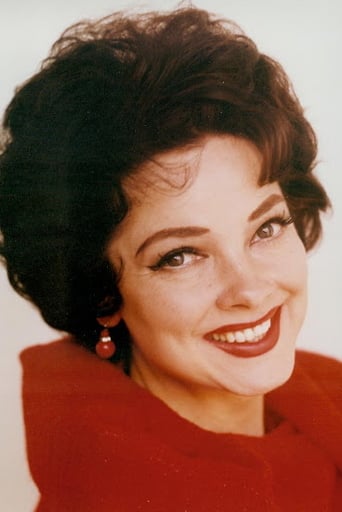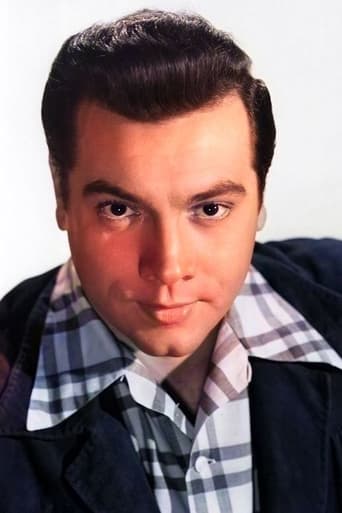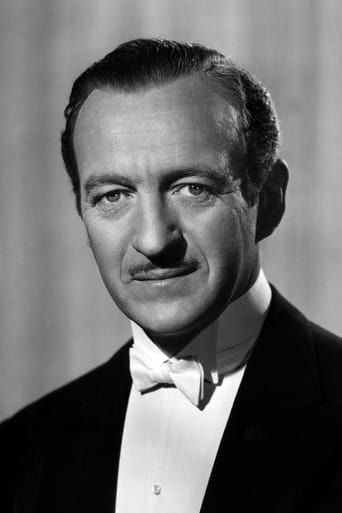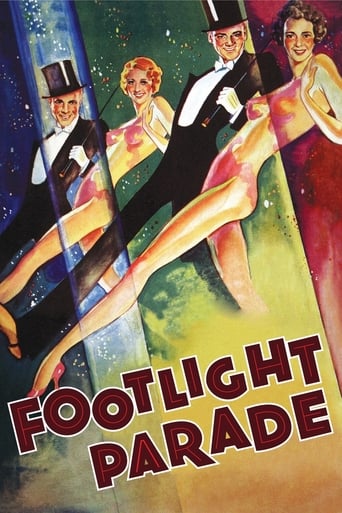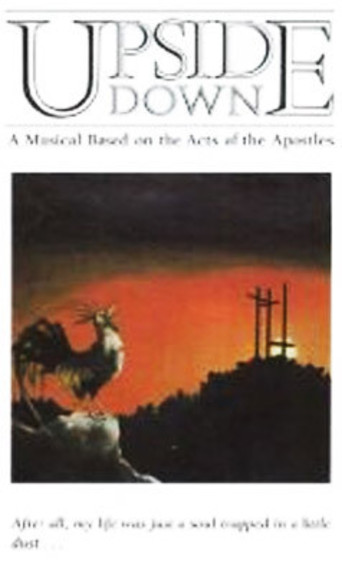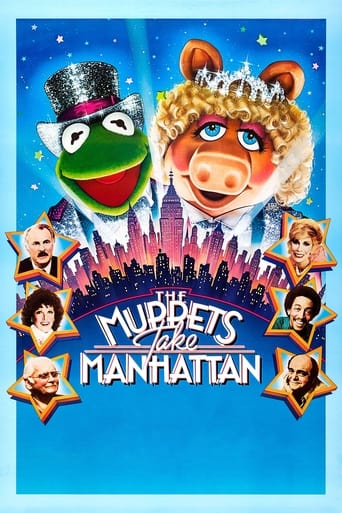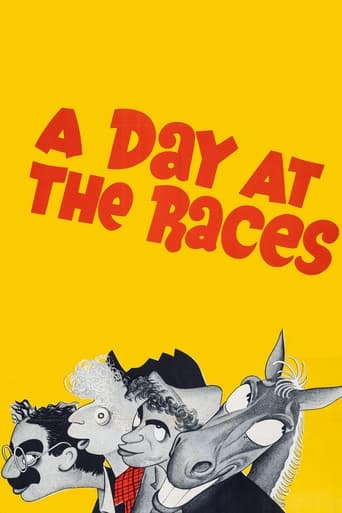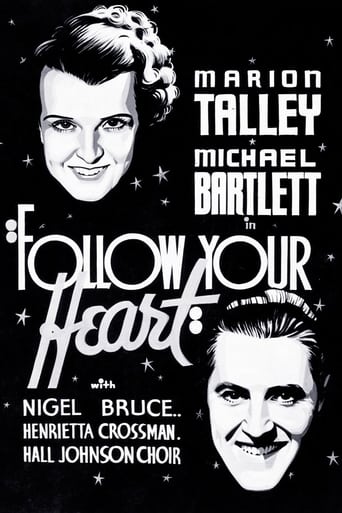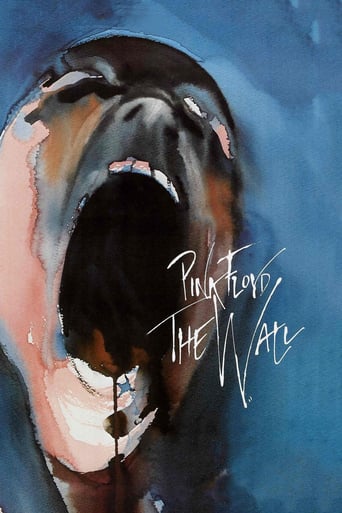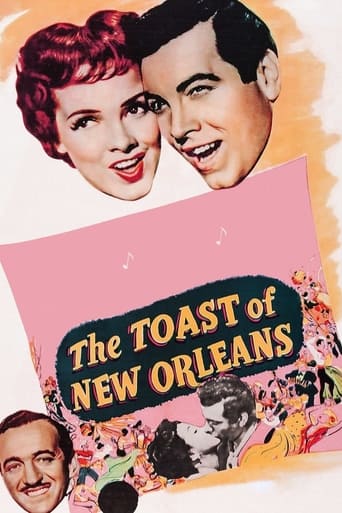
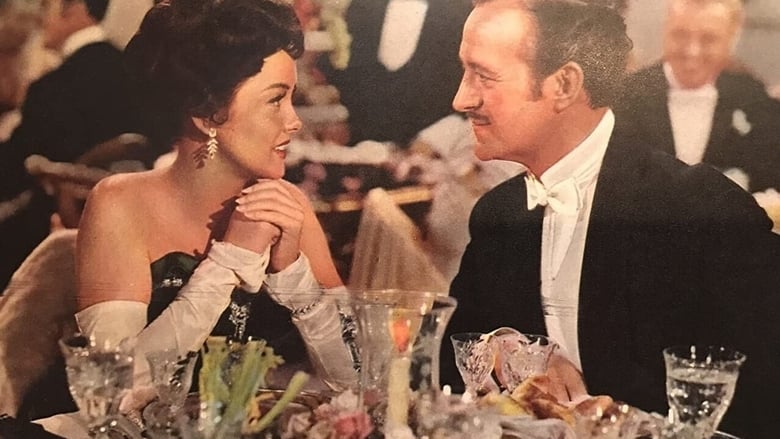
The Toast of New Orleans (1950)
Snooty opera singer meets a rough-and-tumble fisherman in the Louisiana bayous, but this fisherman can sing! Her agent lures him away to New Orleans to teach him to sing opera but comes to regret this rash decision when the singers fall in love.
Watch Trailer
Cast
Similar titles

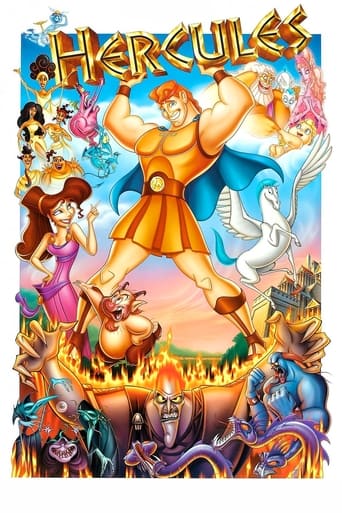
Reviews
Pretty Good
Instead, you get a movie that's enjoyable enough, but leaves you feeling like it could have been much, much more.
There is, somehow, an interesting story here, as well as some good acting. There are also some good scenes
It is both painfully honest and laugh-out-loud funny at the same time.
This is a variation on the much repeated love story in which a cloistered upper class girl must choose between marrying a safe but dull man of her class or a dashing Romeo rogue. Examples include some of MGM's most popular films of the '30s and '40s,such as "Gone with the Wind", "Captain Blood" and "The Adventures of Robin Hood", as well as the poorly received musical "The Pirate". In "The Belle of New York", Fred Astaire's character incorporates both of these elements. Thus, the conflict for Vera Ellen involves trying to reformulate his character so as to bring out the best mix for her(every woman's fantasy!).That is also what this love story is about:making a gentleman as well as a talented opera singer out of a boisterous rough hewn bayou fisherman with a golden singing voice(Mario Lanza), without making him too dull and unromantic.The film begins with the festivities surrounding the annual blessing of the fishing fleet of a small early 20th century bayou fishing village. Evidently, the village mayor has contracted to have an opera star(Kathryn Grayson) and her manager/escort(David Niven) arrive for this festival. Mario spends too long looking at the beautiful Kathryn and grounds his uncle's boat so that they miss having it blessed with holy water: a bad omen, as things turn out. Mario wants to impress Kathryn the only way he knows how: by impulsively joining in her song, and later practically forcing her to join in the local folk dance. This makes Kathryn look foolish twice over. Is that any way to catch a woman of her upper class breeding? Certainly not, but subsequent events might make her change her mind. After his uncle's boat is wrecked in a storm, Mario reluctantly gives up fishing for a possible career as an opera singer.He is groomed as Kathryn's costar, but only after he gets an education on how to behave around upper class opera patrons. His relationship with Kathryn ocillates from cold to warm and back. She is a very difficult woman to consistently please or figure out! Meanwhile, they both do much singing, solo and as a duet, not actually a lot of heavy opera until the finale "Madame Butterfly" performance. At one point, Kathryn asks the unemotional Niven to marry her, apparently to resolve the conflict in her mind about how to respond to Mario's strong romantic overtures.Now, for the very puzzling behavior of Kathryn during and after their "Madame Butterfly" love duet. Obviously, she often looks very anguished and is trying to push Mario away during most of this performance, in contrast to what she should have been doing. Some have interpreted this as the real Kathryn reacting to the real Mario, reflecting her well known aversion to his advances toward her, garlic eating, and other rude behaviors between takes. I can't believe MGM would allow this to show so blatantly, although it may have been a contributing factor. Rather, I favor the following interpretation as being the dominant explanation: Before this performance, Kathryn, as well as several of Mario's village friends complain that he has become too much of a gentleman, afraid of showing his impulsive rogue persona that village girls found so irresistible. Basically, she's playing hard to get, again, hoping the old Mario will break through his gentlemanly facade to sweep her off her feet. Meanwhile, Mario has gotten a hint from Niven that he should do this. Symbolically,this happens in his forceful treatment of her during their duet, a subsequent chase around the stage area, and when he breaks through her locked dressing room. End of story. Yes, Kathryn's character was a complicated and difficult woman to fathom, which some reviewers interpret as bad acting. Not so!I found J Carrol Naish an entertaining and sometimes hilarious 'sidekick' for Mario, providing comedic relief throughout, along with the Mario-Kathryn unlikely pairing comedy. His character remained unimpressed with NO high society culture,refusing to be transformed by it, as Mario had been. Naish had been incorporated into several of Fox's high profile Latino-oriented musicals of the early '40s, again as a somewhat humorous supporting character. David Niven retains his British upper class reserve and charm throughout, as Kathryn's chaperon, overseer and probable lover: the alternative safe choice for Kathryn as a husband.
Using the formula that worked so well in "That Midnight Kiss," Mario Lanza, this time one Pepe Duvalle, is again discovered by someone with connections to the opera world while he's singing his heart out doing his normal job. Here he's a bayou fisherman, but after the loss of their boat, Pepe and his Uncle Nicky (J. Carrol Naish) head to New Orleans to look up the opera director (David Niven) who offered Pepe an opportunity after hearing him in the village when Pepe joins his prima donna (Grayson) in song. Pepe finds himself in love with the somewhat cold diva, who is being pursued by Niven.Lanza is in fine form as a crude, loud, uneducated man who, in order to fit into New Orleans society and the opera world, has to learn manners, as well as how to dance and dress. A natural actor, he makes his complete transformation believable. He sings Jose's aria from "Carmen" beautifully, and this film introduces his hit, "Be My Love" to audiences, which he sings with Grayson. With the diminutive soprano, he also does "Libiamo" from "La Traviata." In the days in which this story is set, a singer like Grayson would have sung "Traviata," though audiences aren't used to hearing a fluttery coloratura sing it any longer. The two perform the love duet from "Madama Butterfly" as well - an absolutely horrid choice for Grayson, calling for a much weightier voice. Obviously the repertoire was chosen with Lanza in mind. Had MGM not used "Lucia" in "That Midnight Kiss," they could have perhaps used it here. Grayson gets to use her high extension in "Je suis Titania," but the rest of the aria suffers from pitch difficulties.Lanza really helped to commercialize opera in the United States, but he did it without the help of MGM. Is it necessary for Niven to give the wrong explanation for the duet "La ci darem la mano?" And why, during the Butterfly duet, which is total foreplay, does Grayson constantly try to get away from Lanza? No matter her personal feelings, she was on stage playing a role.Grayson looks lovely in an assortment of magnificent gowns and hats, and if her voice doesn't match Lanza's, it doesn't mean she could not have sung opera, which is often the criticism. There is definitely a place for coloratura sopranos in the opera world - just not singing with spinto tenors.J. Carrol Naish plays an embarrassing, annoying stereotype as Uncle Nicky; Niven is wonderful, if underused, and his perfect voice and smooth manners are in great juxtaposition to Lanza's bumbling Pepe. James Mitchell, known to soap opera audiences now as Palmer Courtland on "All My Children" has a good featured part as a friend of Pepe's from the bayou, and he and a very young Rita Moreno, who's in love with Pepe, do a spirited dance number.Lanza's reign at MGM was disappointingly short, and yo-yo dieting and drinking would claim his life nine years after this film. But what years, in which he gifted the world with his fresh, passionate, Italianate sound and thrilled millions of people all over the world.
I've watched this film more than 50 times, and as much as I watch as much as I like best. Mario Lanza was just unique, I agree that he did not educated his voice enough, but his natural voice was so wonderful, none of the best tenors hadn't his magnificent voice, is enough to know that Mo. Toscanini said that was "The Voice of the Century". This film is fresh and light and romantic, Mario's performance of "Be my love" as a duet is nice too, and "Madame Butterfly duet" is the greatest I've ever heard. David Niven, J. Carroll Naish and Rita Moreno, each one in the role they played are just wonderful too. Mario Lanza should be in the opera stage but if so, common people didn't had the opportunity to be delight with opera.
David Niven discovers Mario Lanza, a Cajun fisherman who leaves the Bayou and falls in love with opera singer, Kathryn Grayson. Lushly photographed in the usual grand MGM manner of gaudy costumes and lots of background color, the simple storyline serves as an excuse to have Lanza belt out some ringing tenor numbers and blend his voice with Grayson for some tuneful arias. Opera fans will love it--others beware!The humor gets a bit overdone with J. Carrol Naish straining for laughs and there's only a glimpse of Rita Moreno in a dance number. But brimming over with arias from "Carmen", "La Traviata" and "Martha", music lovers should have no complaints. Lanza and Grayson are both in fine voice and one would never suspect that she soon tired of his boorish antics on the set and would later refuse to co-star with him when MGM wanted her to do one more film with Lanza.
